-
 Bitcoin
Bitcoin $106,731.2224
-1.05% -
 Ethereum
Ethereum $2,444.9804
-1.20% -
 Tether USDt
Tether USDt $1.0003
0.01% -
 XRP
XRP $2.1882
0.09% -
 BNB
BNB $651.1435
-0.61% -
 Solana
Solana $148.3252
-2.09% -
 USDC
USDC $1.0000
0.01% -
 TRON
TRON $0.2787
0.55% -
 Dogecoin
Dogecoin $0.1598
-3.16% -
 Cardano
Cardano $0.5520
-2.43% -
 Hyperliquid
Hyperliquid $39.0960
-2.64% -
 Bitcoin Cash
Bitcoin Cash $516.9519
2.98% -
 Sui
Sui $2.7011
-2.95% -
 Chainlink
Chainlink $13.0582
-1.71% -
 UNUS SED LEO
UNUS SED LEO $8.9250
-2.53% -
 Stellar
Stellar $0.2359
-0.18% -
 Avalanche
Avalanche $17.3856
-3.73% -
 Toncoin
Toncoin $2.8095
-3.56% -
 Shiba Inu
Shiba Inu $0.0...01121
-1.95% -
 Litecoin
Litecoin $85.2795
-0.85% -
 Hedera
Hedera $0.1471
-2.15% -
 Monero
Monero $319.8004
1.12% -
 Dai
Dai $1.0001
0.01% -
 Ethena USDe
Ethena USDe $1.0001
0.02% -
 Bitget Token
Bitget Token $4.5344
-1.07% -
 Polkadot
Polkadot $3.3224
-2.96% -
 Uniswap
Uniswap $6.9697
-2.75% -
 Aave
Aave $266.1658
-2.25% -
 Pepe
Pepe $0.0...09414
-3.41% -
 Pi
Pi $0.4913
-3.29%
Blockchain asset security: the applicable scenarios of hot wallets and cold wallets
Hot wallets are ideal for frequent trading and small amounts, while cold wallets suit long-term holding and large sums, balancing security and convenience.
Apr 06, 2025 at 11:29 am

Blockchain asset security is a critical concern for cryptocurrency users, and understanding the applicable scenarios of hot wallets and cold wallets is essential for safeguarding digital assets. Hot wallets and cold wallets serve different purposes and offer varying levels of security and convenience. In this article, we will explore the characteristics of both types of wallets and discuss the scenarios in which each is most suitable.
Hot wallets, also known as online wallets, are connected to the internet and designed for frequent transactions. They are typically provided by cryptocurrency exchanges or wallet service providers. Hot wallets are convenient for users who need to access their funds quickly and frequently, such as traders or those who regularly make payments in cryptocurrencies. However, due to their online nature, hot wallets are more vulnerable to hacking and cyber attacks.
Characteristics of Hot Wallets
Hot wallets are characterized by their ease of use and accessibility. They often come with user-friendly interfaces and support multiple cryptocurrencies. Some key features of hot wallets include:
- Instant access to funds for quick transactions
- Multi-currency support for managing various cryptocurrencies in one place
- Integration with exchanges for seamless trading
- Mobile and web-based applications for on-the-go access
Despite these advantages, hot wallets have significant security drawbacks. Since they are connected to the internet, they are more susceptible to hacking attempts, phishing attacks, and malware infections. Users must take extra precautions, such as enabling two-factor authentication (2FA) and using strong, unique passwords, to mitigate these risks.
Applicable Scenarios for Hot Wallets
Hot wallets are best suited for the following scenarios:
- Frequent trading: Traders who need to buy and sell cryptocurrencies quickly can benefit from the instant access provided by hot wallets.
- Daily transactions: Users who regularly use cryptocurrencies for payments or transfers can use hot wallets for convenience.
- Small amounts: Storing small amounts of cryptocurrencies in hot wallets can be acceptable, as the potential loss is minimal.
- Testing and learning: Beginners who want to experiment with cryptocurrencies can use hot wallets to gain experience without risking large sums.
Cold wallets, on the other hand, are offline storage solutions designed for long-term holding of cryptocurrencies. They are not connected to the internet, which significantly reduces the risk of hacking and cyber attacks. Cold wallets come in various forms, including hardware wallets, paper wallets, and offline software wallets. They are ideal for users who prioritize security over convenience and plan to hold their assets for an extended period.
Characteristics of Cold Wallets
Cold wallets are known for their high level of security and are suitable for storing large amounts of cryptocurrencies. Some key features of cold wallets include:
- Offline storage to protect against online threats
- Physical security through hardware devices or paper backups
- Private key control for enhanced security and ownership
- Long-term storage for holding assets securely over time
While cold wallets offer superior security, they can be less user-friendly and more cumbersome to use compared to hot wallets. Users must take extra steps to set up and manage their cold wallets, such as securely storing their private keys and backup phrases. However, the added security measures are worth the effort for those who prioritize the safety of their assets.
Applicable Scenarios for Cold Wallets
Cold wallets are most suitable for the following scenarios:
- Long-term holding: Investors who plan to hold their cryptocurrencies for an extended period should use cold wallets to protect their assets.
- Large amounts: Storing significant amounts of cryptocurrencies in cold wallets minimizes the risk of loss due to hacking or theft.
- High-value assets: Users with high-value cryptocurrencies should opt for cold wallets to ensure the safety of their investments.
- Inheritance planning: Cold wallets can be used to securely store cryptocurrencies for future generations, as they can be easily passed on with proper documentation.
Choosing Between Hot and Cold Wallets
When deciding between hot and cold wallets, users must consider their specific needs and risk tolerance. For those who require frequent access to their funds and prioritize convenience, hot wallets may be the better choice. However, users who prioritize security and plan to hold their assets for the long term should opt for cold wallets.
It's worth noting that many cryptocurrency users employ a combination of both hot and cold wallets to balance security and convenience. They may keep a small amount of funds in a hot wallet for daily transactions while storing the majority of their assets in a cold wallet for long-term security.
Best Practices for Using Hot and Cold Wallets
To maximize the security of your blockchain assets, consider the following best practices when using hot and cold wallets:
- Use strong passwords and enable 2FA for hot wallets to add an extra layer of security.
- Regularly update wallet software to protect against known vulnerabilities.
- Keep backup phrases and private keys secure for cold wallets, preferably in a safe or a secure location.
- Use reputable wallet providers and thoroughly research their security measures before entrusting them with your funds.
- Diversify your storage solutions by using a combination of hot and cold wallets to minimize risk.
Common Questions About Hot and Cold Wallets
Q: What is the main difference between hot and cold wallets?
A: The primary difference between hot and cold wallets lies in their connection to the internet. Hot wallets are online and connected to the internet, making them convenient for frequent transactions but more vulnerable to hacking. Cold wallets, on the other hand, are offline and not connected to the internet, providing a higher level of security for long-term storage.
Q: Can I use both hot and cold wallets simultaneously?
A: Yes, many cryptocurrency users employ a combination of hot and cold wallets to balance security and convenience. They may keep a small amount of funds in a hot wallet for daily transactions while storing the majority of their assets in a cold wallet for long-term security.
Q: How do I choose the right wallet for my needs?
A: When choosing a wallet, consider your specific needs and risk tolerance. If you require frequent access to your funds and prioritize convenience, a hot wallet may be suitable. However, if you prioritize security and plan to hold your assets for the long term, a cold wallet is the better choice. Research different wallet options and their features to find the one that best aligns with your requirements.
Q: What are some reputable cold wallet options?
A: Some reputable cold wallet options include hardware wallets like Ledger and Trezor, which offer secure offline storage for cryptocurrencies. Paper wallets, created by generating and printing private keys offline, are another option for cold storage. Offline software wallets, such as those run on air-gapped computers, can also be used as cold wallets.
Q: How can I ensure the security of my hot wallet?
A: To enhance the security of your hot wallet, use strong, unique passwords and enable two-factor authentication (2FA). Regularly update your wallet software to protect against known vulnerabilities. Be cautious of phishing attempts and only access your wallet through official channels. Additionally, consider keeping only small amounts of funds in your hot wallet to minimize potential losses in case of a security breach.
Disclaimer:info@kdj.com
The information provided is not trading advice. kdj.com does not assume any responsibility for any investments made based on the information provided in this article. Cryptocurrencies are highly volatile and it is highly recommended that you invest with caution after thorough research!
If you believe that the content used on this website infringes your copyright, please contact us immediately (info@kdj.com) and we will delete it promptly.
- Deutsche Bank's Bitcoin Custody Play: A New York Minute on Crypto Services
- 2025-07-01 22:30:12
- ZachXBT, Ripple, and RLUSD Adoption: A Deep Dive
- 2025-07-01 22:30:12
- Open XP Redemption on Optimism: Get Ready for OP Tokens on July 15!
- 2025-07-01 22:35:12
- Altcoins in June 2025: Data, Trends, and What's Next for Crypto
- 2025-07-01 21:30:12
- SUI Price Breakout Watch: Will 2025 Forecasts Hit the Mark?
- 2025-07-01 21:30:12
- BTCBULL: Riding Bitcoin's Bull Run to Crypto Glory
- 2025-07-01 20:30:11
Related knowledge
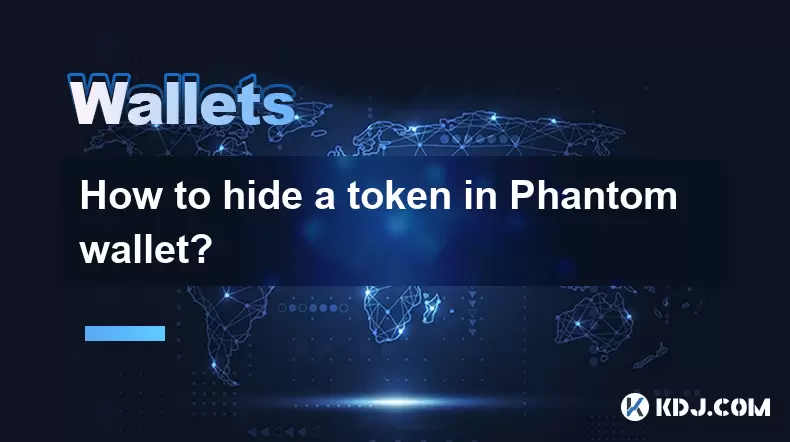
How to hide a token in Phantom wallet?
Jul 01,2025 at 05:49pm
Understanding the Phantom Wallet InterfacePhantom wallet is a popular non-custodial wallet used primarily for interacting with the Solana blockchain. It allows users to store, send, receive, and manage various tokens, including both fungible and non-fungible tokens (NFTs). Before attempting to hide a token, it's essential to understand how the wallet in...
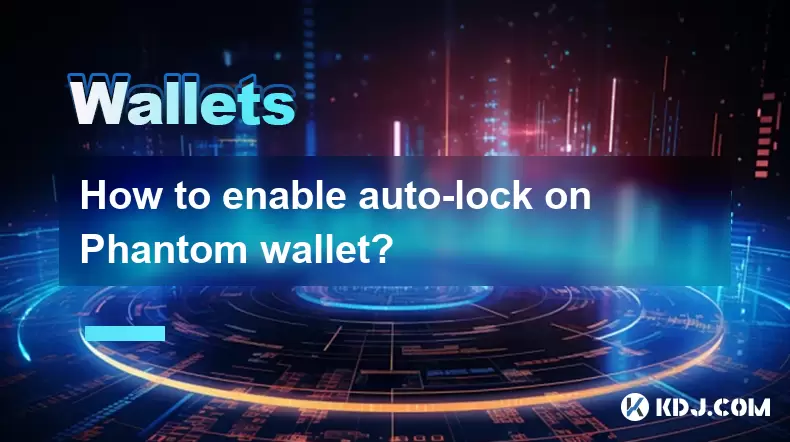
How to enable auto-lock on Phantom wallet?
Jul 01,2025 at 04:01pm
What is Auto-Lock in Phantom Wallet?Phantom wallet is a popular non-custodial cryptocurrency wallet used primarily for interacting with the Solana blockchain. One of its security features includes the ability to set an auto-lock timer, which ensures that the wallet locks itself automatically after a period of inactivity. Auto-lock enhances security by p...
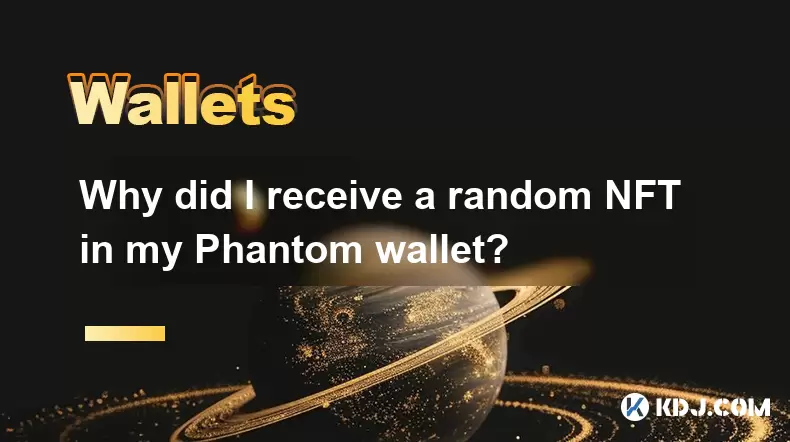
Why did I receive a random NFT in my Phantom wallet?
Jul 01,2025 at 09:00pm
Receiving an Unexpected NFT in Your Phantom WalletIf you've recently opened your Phantom wallet and noticed an unfamiliar NFT appearing in your collection, you're not alone. Many users have reported receiving random or unsolicited non-fungible tokens, often without any prior interaction with the project or sender. This phenomenon has become increasingly...
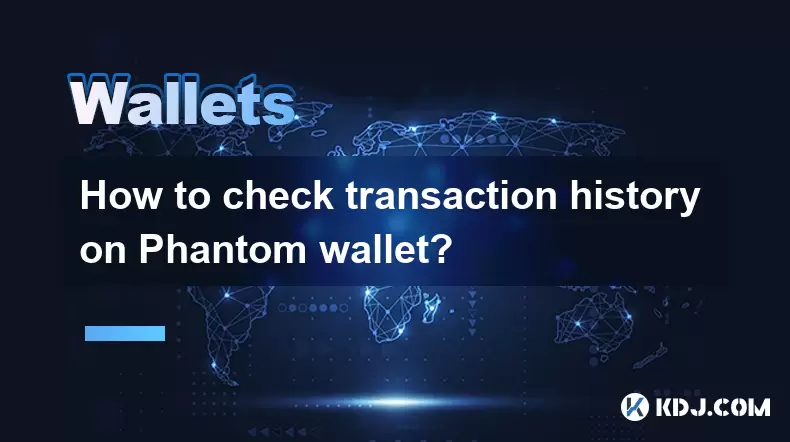
How to check transaction history on Phantom wallet?
Jul 01,2025 at 07:49pm
What Is Phantom Wallet?Phantom wallet is a popular non-custodial cryptocurrency wallet primarily used for interacting with the Solana blockchain. It allows users to store, send, receive, and manage their Solana-based tokens and NFTs securely. One of the essential features of any crypto wallet is the ability to check transaction history. Understanding ho...
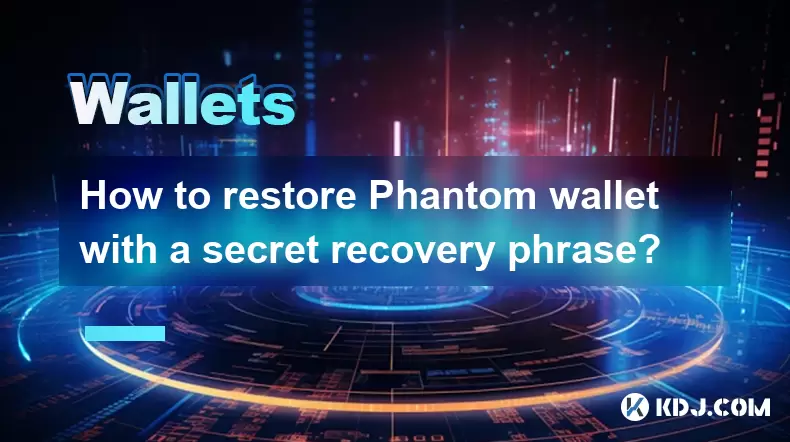
How to restore Phantom wallet with a secret recovery phrase?
Jul 01,2025 at 02:56pm
What is a Phantom wallet and why might you need to restore it?Phantom is a popular non-custodial cryptocurrency wallet primarily used for interacting with the Solana blockchain. It allows users to store, send, receive, and stake SOL tokens as well as manage NFTs and other SPL tokens. Since Phantom wallet is non-custodial, users are solely responsible fo...
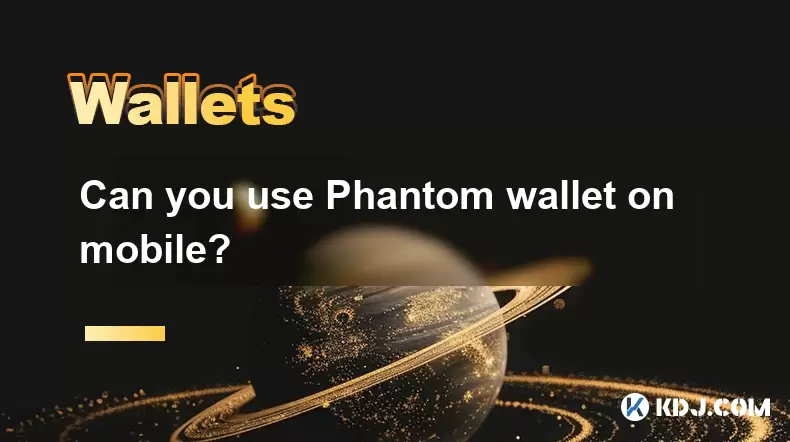
Can you use Phantom wallet on mobile?
Jul 01,2025 at 06:07pm
Understanding Phantom Wallet and Its Mobile CompatibilityPhantom wallet is a non-custodial cryptocurrency wallet primarily designed for interacting with the Solana blockchain. Initially developed as a browser extension, Phantom has expanded its functionality to include mobile platforms. This means users can access their Solana-based assets on mobile dev...

How to hide a token in Phantom wallet?
Jul 01,2025 at 05:49pm
Understanding the Phantom Wallet InterfacePhantom wallet is a popular non-custodial wallet used primarily for interacting with the Solana blockchain. It allows users to store, send, receive, and manage various tokens, including both fungible and non-fungible tokens (NFTs). Before attempting to hide a token, it's essential to understand how the wallet in...

How to enable auto-lock on Phantom wallet?
Jul 01,2025 at 04:01pm
What is Auto-Lock in Phantom Wallet?Phantom wallet is a popular non-custodial cryptocurrency wallet used primarily for interacting with the Solana blockchain. One of its security features includes the ability to set an auto-lock timer, which ensures that the wallet locks itself automatically after a period of inactivity. Auto-lock enhances security by p...

Why did I receive a random NFT in my Phantom wallet?
Jul 01,2025 at 09:00pm
Receiving an Unexpected NFT in Your Phantom WalletIf you've recently opened your Phantom wallet and noticed an unfamiliar NFT appearing in your collection, you're not alone. Many users have reported receiving random or unsolicited non-fungible tokens, often without any prior interaction with the project or sender. This phenomenon has become increasingly...

How to check transaction history on Phantom wallet?
Jul 01,2025 at 07:49pm
What Is Phantom Wallet?Phantom wallet is a popular non-custodial cryptocurrency wallet primarily used for interacting with the Solana blockchain. It allows users to store, send, receive, and manage their Solana-based tokens and NFTs securely. One of the essential features of any crypto wallet is the ability to check transaction history. Understanding ho...

How to restore Phantom wallet with a secret recovery phrase?
Jul 01,2025 at 02:56pm
What is a Phantom wallet and why might you need to restore it?Phantom is a popular non-custodial cryptocurrency wallet primarily used for interacting with the Solana blockchain. It allows users to store, send, receive, and stake SOL tokens as well as manage NFTs and other SPL tokens. Since Phantom wallet is non-custodial, users are solely responsible fo...

Can you use Phantom wallet on mobile?
Jul 01,2025 at 06:07pm
Understanding Phantom Wallet and Its Mobile CompatibilityPhantom wallet is a non-custodial cryptocurrency wallet primarily designed for interacting with the Solana blockchain. Initially developed as a browser extension, Phantom has expanded its functionality to include mobile platforms. This means users can access their Solana-based assets on mobile dev...
See all articles

























































































